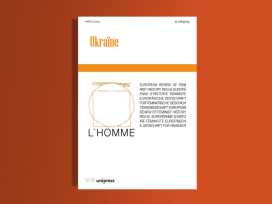Abstracts for L'Homme 1/2005
ANJA WECKWERT
Oppositions – controversies about gender relations, women’s movements, and feminism in the BRD
Taking the controversial diagnoses of gender relations, women’s movements, and feminism in Germany as a starting point, the article seeks to tackle some of the current contradictions that characterize both academic discourse and societal development. The article asks how to conceive of the relationship between change and persistence that marks current gender relations. Following the thesis of a “rhetorical modernization” (Angelika Wetterer), it is suggested that the rhetoric of gender equality has become dominant in media and everyday discourse, but tends to contradict and conceal ongoing gender inequalities. The question is if and how “rhetorical modernization” shapes young women’s conceptions of gender and influences their attitudes towards gender politics, women’s movements, and feminism. The article is based on interviews with women of the German hacker community who pursue a gender agenda for the advancement of women in this male-dominated field, but who at the same time remain sceptical towards feminism. The author argues that the historically close relationship between gender politics, women’s movements, and feminism has become fragile in several regards. Leaving behind mere crisis diagnosis, it will be important to comprehend these developments in the context of social change.
RALITSA MUHARSKA
Silences and parodies in the East-West feminist dialogue
The text argues that in the dialogue taking place in the international feminist community since the 1990s, between its established part in the West and its (relatively) new members in eastern Europe, there are silences, gaps in communication that are to a considerable extent determined by the uneven distribution of power in that community.
These gaps – the missing links, the misunderstandings, the cultural differences, and the respective assumptions, the insufficient or distorted knowledge, and so on – allow for the appearance of ambiguities, for the doubling, or multiplication, of meanings. It is argued that such effects, which can be likened to parodic practices, albeit unintentional in the majority of cases, are more likely to appear on the east European side of the dialogue, as that side has little access to power, both at home and internationally.
The subversive effect of such practices on the East-West dialogue can be said to act as a stimulus for development of the feminist discursive community.
ANDREA ZINK
Milorad Pavic’s “Dictionary of the Khazars”: Postmodern and classical masculine
Milorad Pavic’s “Dictionary of the Khazars” (1986) can be considered the most famous postmodern book written in Serbian. Even abroad it was celebrated as the first “novel” (the genre is uncertain) of the twenty-first century. In various ways, Pavic uses postmodern techniques to confuse and dissociate identities, most prominently sex and gender. Pavic opposes his readers to a male and a female edition of his “dictionary”, thus indicating the importance of the main theme: even books are gendered. This difference, however, seems to be ridiculous as only one short passage proves the manliness or womanliness of the text which we – without the narrator’s help – would not even be able to find. Pavic plays with the biological concept of woman and man, the so-called “nature”, with a gendered grammar (ie the Khazar language has special categories for those who have lost their sex), with the juridical concepts of bequeathing to sons. However, on closer examination, this play is limited. Pavic restricts his manoeuvres to the well-known dualism, to male and female parts (of bodies, books, winds, directions, grammatical categories), which, in spite of all confusion, are attracted to each other. There is no third gender, and the possibility of homosexuality is missing entirely. Despite (and because of) its attractive playfulness, the “dictionary” illustrates the conflict between postmodernism and feminism (as shown in the disputes between Seyla Benhabib, Nancy Frazer, and Judith Butler), it illustrates the – possible while not necessary – conservative implications of postmodern texts and the problem of a feminist critique based on them.
SUSAN ZIMMERMANN
Women’s and Gender Studies in higher education in central eastern Europe and the post-Soviet space. Part 2: Actors and interests in the process of institutionalization
In exploring the history of the institutionalization of Women’s and Gender Studies in higher education in central eastern Europe and the Post-Soviet Space since the late 1980s, this study seeks to contribute to our understanding of the role of Women’s and Gender Studies in the context of larger changes in higher education worldwide. The history of this institutionalization – while always potentially endangered, and not to be overestimated in its overall scope and impact – should be considered a success story. Women’s and Gender Studies in higher education in this region have developed in a complex triangle between the impact and interests of a whole variety of transnational actors, the changing politics of higher education on national and university levels, and the interests and aspirations of academics on the ground, rooted in academic and non-academic contexts. The study explores these constellations as they have changed over time, and varied between the major sub-regions within the central eastern European and post-Soviet space. It highlights the often unequal processes of internationalization, the partial privatization of higher education, the strategic function ascribed to Gender Studies in the process of transforming higher education on local, national, and international levels. It also looks at the crucial role played by the often genuine dedication of academics spreading the word and the institution. All of these are seen as the major factors explaining the success story of the Women’s and Gender Studies trade in the “other half of Europe” and the non-European territories of former “state-socialism”.
Published 18 July 2005
Original in English
Contributed by L'Homme © L'Homme Eurozine
PDF/PRINTNewsletter
Subscribe to know what’s worth thinking about.



